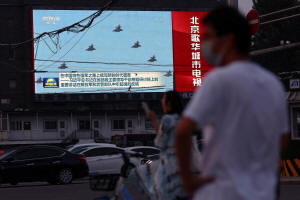|
U.S. Indo-Pacific coordinator Kurt Campbell said on Friday that
China "overreacted" to U.S. House of Representatives Speaker
Nancy Pelosi's visit to Taiwan, which set off days of war games
by Beijing around the island, which China views as its own
territory.
Taiwan's foreign ministry said in a statement on Saturday that
China's "unprovoked military and economy intimidation" had
"further strengthened the unity and resilience of the global
democratic camp".
Taiwan President Tsai Ing-wen said on Thursday that China's
threat of force is undiminished, even though Beijing's largest-
ever military drills around the island, following Pelosi's visit
last week, seemed to be scaling down.
At a rally on Saturday in southern Taiwan for local elections
scheduled for late November, Tsai said they were not just facing
rival candidates, "but also pressure from China".
"Taiwanese are very enthusiastic and love freedom and democracy,
so many good international friends have come to Taiwan to
support us. This is a normal and good thing, but China threatens
and intimidates Taiwan," she said.
"However, I would like to reassure everyone that both our
government and the military are prepared, and I will definitely
take care of Taiwan."
Taiwan's government says that as the People's Republic of China
has never ruled the island, it has no right to claim it or
decide its future, which can only be set by Taiwan's people.
The defeated Republic of China government fled to Taiwan in 1949
after losing a civil war to Mao Zedong's Communist Party, which
established the People's Republic of China in Beijing.
China has never renounced the use of force to bring
democratically governed Taiwan under its control.
(Reporting by Sarah Wu; Writing by David Kirton and Ben
Blanchard; Editing by Tom Hogue, Michael Perry and William
Mallard)
[© 2022 Thomson Reuters. All rights
reserved.]
This material may not be published,
broadcast, rewritten or redistributed.
Thompson Reuters is solely responsible for this content.

|
|




